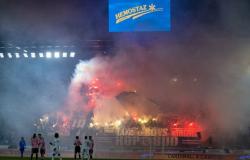Algeria Football– During a recent intervention before the Finance and Economic Development Committee of the House of Representatives of Morocco, Fouzi Lekjaa, Minister Delegate in charge of the Budget and President of the Royal Moroccan Football Federation, revealed the broad outlines of the preparation of Morocco to host the 2030 World Cup. Planned in co-organization with Spain and Portugal, this edition will mark the second time that the competition will be held in Africa, after that of 2010 in South Africa. Lekjaa expressed Morocco’s ambitious vision for this event, which involves large-scale investment in sports and urban infrastructure.
According to Fouzi Lekjaa, no less than 32 Moroccan cities are expected to host the participating teams. These will be distributed between different accommodation sites and training facilities. At the same time, he spoke of the pressing need to build a new stadium in Casablanca, which would meet the expectations of a large base of supporters, in particular those of the city’s emblematic clubs, Wydad and Raja Casablanca. The President of the Federation thus underlined the importance of developing high-quality infrastructure to meet international standards and offer teams and spectators an optimal welcome.
Lekjaa also recalled that this project is part of a broader development dynamic, initiated since the start of the new reign. This ambitious vision includes the modernization of the rail network with the extension of the TGV to the cities of Marrakech and Agadir, located in the south of the country and considered strategic centers. At the same time, the country’s main airports, notably those of Marrakech, Agadir, Fez, Tangier, and Casablanca, will also need to be expanded to accommodate the influx of tourists and visitors, particularly in the run-up to the World Cup.
These infrastructure works aim not only to meet the requirements of organizing the World Cup, but also to strengthen Morocco’s tourism capabilities. Indeed, upgrading these infrastructures is seen as a lever for development, whether the World Cup is held or not. This sustainable approach is part of Morocco’s bid for the world tournament, which emphasizes the long-term use of sports facilities and other projects carried out for the event.
The minister also underlined the inclusive aspect of the 2030 World Cup, which should benefit all regions of Morocco. Indeed, a team based in Rabat could very well play its matches in a city like Nador, located in the east of the country. Lekjaa insisted on the “Moroccan, African and Arab” character of this event, which will be a source of pride for the entire continent and the Arab world.
Also read:
JS Kabylie: the players pocketed a bonus of 50 million!





